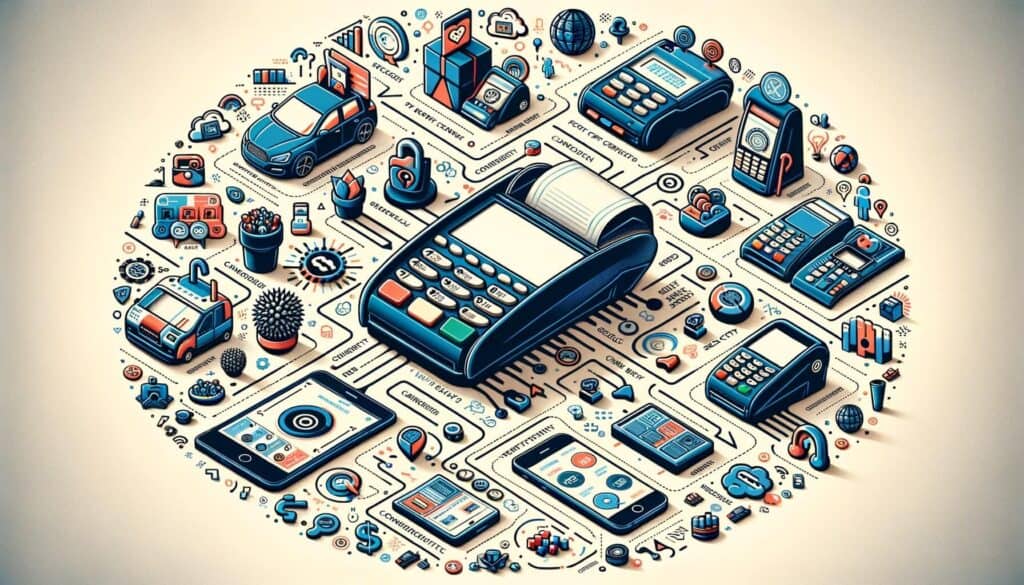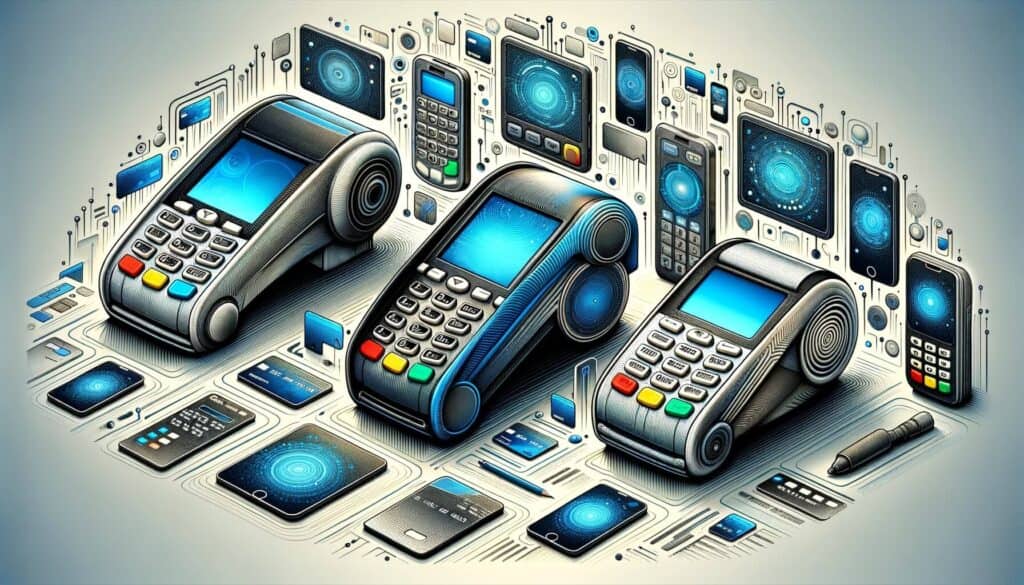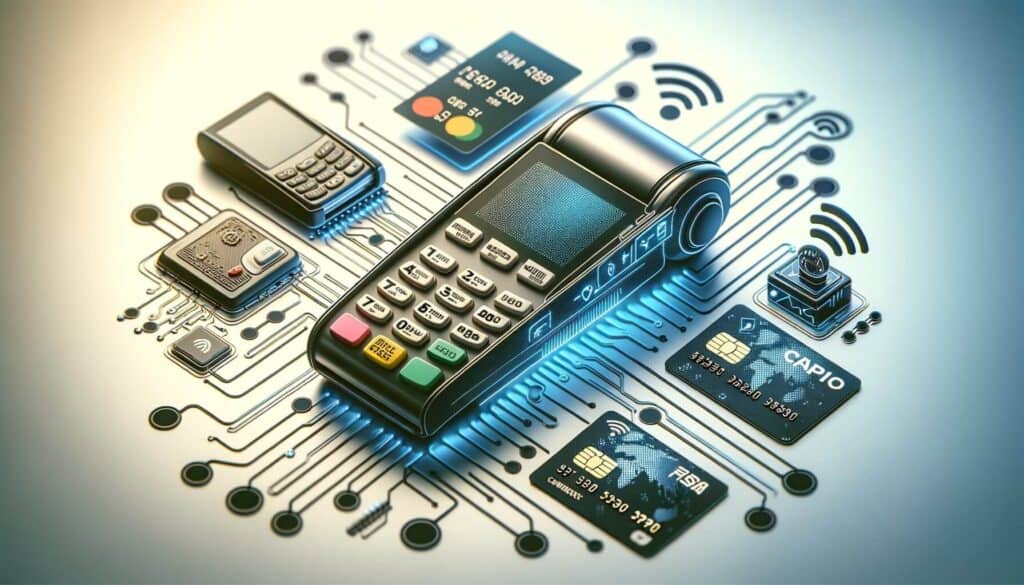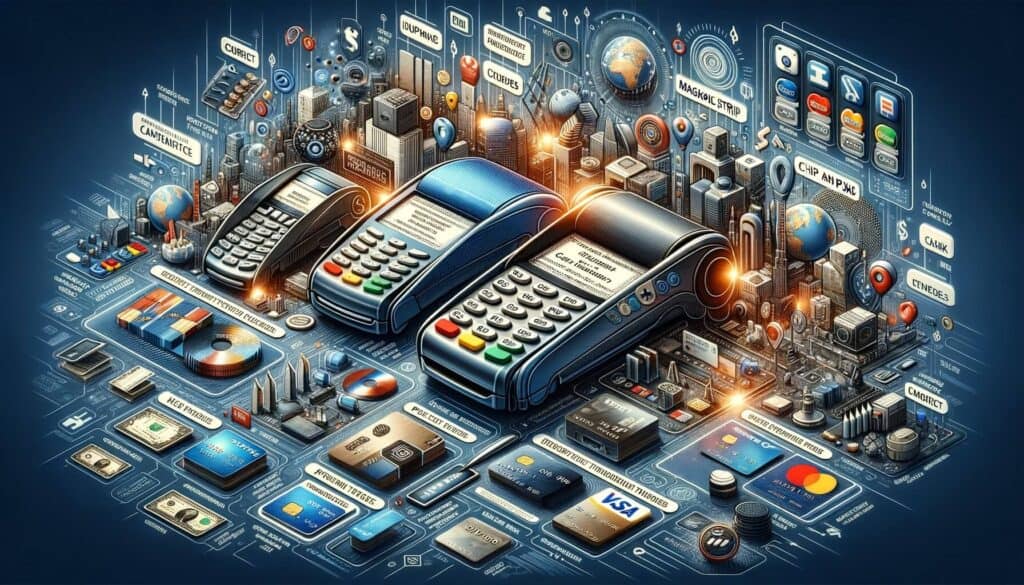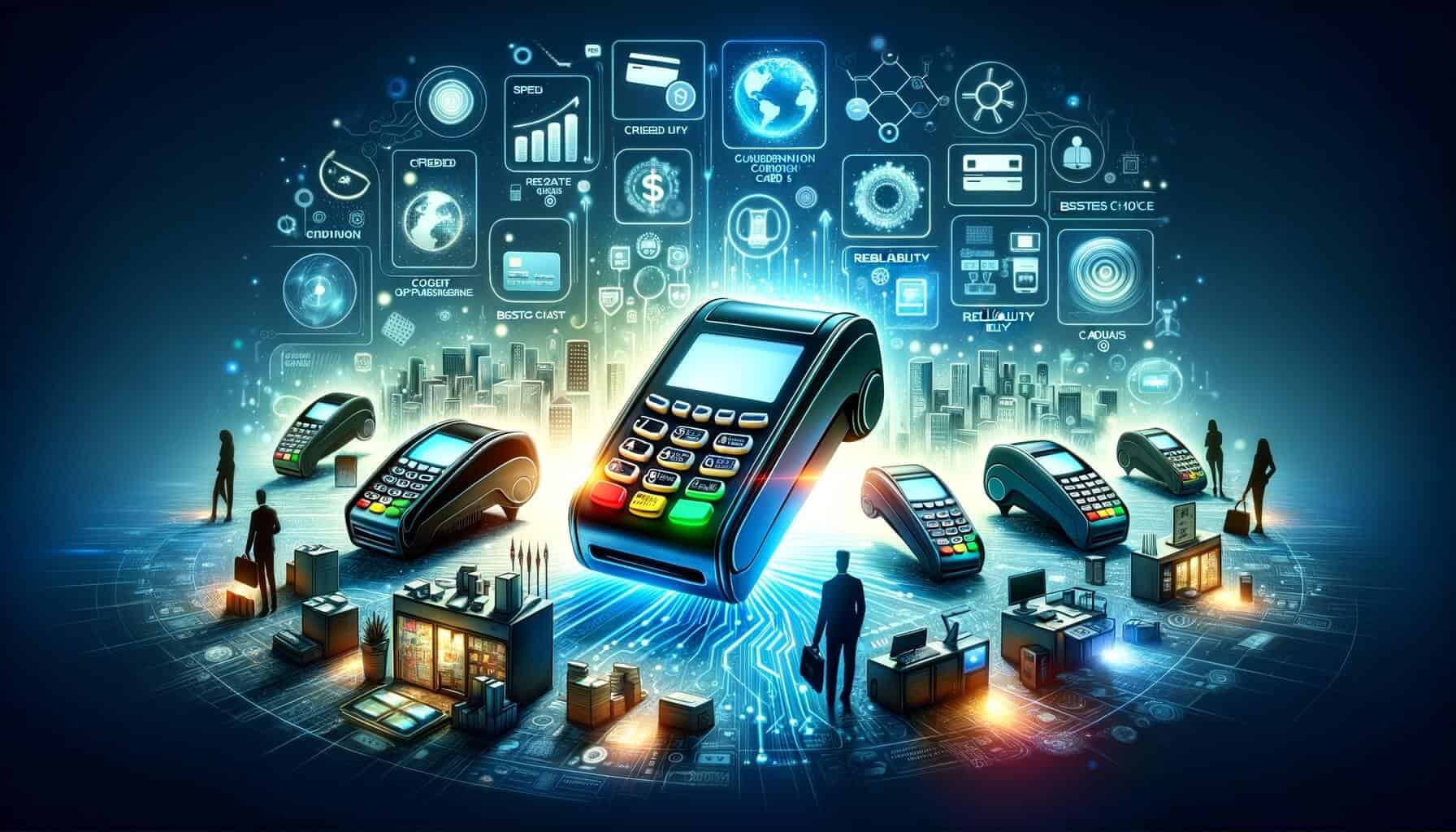
By American April 3, 2025
In today’s digital age, accepting credit card payments is essential for businesses of all sizes. Whether you run a small retail store or a large e-commerce platform, having a reliable and efficient credit card machine is crucial for smooth transactions and customer satisfaction. However, with so many options available in the market, selecting the best credit card machine for your business can be a daunting task.
This comprehensive guide will walk you through the factors to consider, types of credit card machines, evaluating features and functionality, payment processing options, security measures, costs and fees, and provide a step-by-step guide to help you choose the best credit card machine for your business.
Factors to Consider When Selecting a Credit Card Machine for Your Business
Before diving into the different types of credit card machines, it’s important to understand the key factors to consider when making your selection. These factors will help you narrow down your options and choose a machine that aligns with your business needs. Here are some crucial factors to keep in mind:
1. Business Type and Size: The first factor to consider when selecting a credit card machine is your business type and size. Different industries have different requirements, and the volume of transactions can vary significantly. For example, a small coffee shop may only need a basic countertop terminal, while a large retail store may require a more advanced point-of-sale (POS) system.
2. Connectivity Options: Credit card machines can be connected via various methods, including landline, internet, or wireless. Consider the availability and reliability of these options in your area. If you have a physical store, a landline or internet connection may be suitable. However, if you operate a mobile business or attend trade shows, a wireless credit card machine would be more convenient.
3. Payment Types: Consider the types of payments you want to accept. While credit and debit cards are standard, some businesses may also want to accept mobile payments, such as Apple Pay or Google Wallet. Ensure that the credit card machine you choose supports the payment types you require.
4. Integration with Existing Systems: If you already have a POS system or accounting software in place, it is essential to choose a credit card machine that seamlessly integrates with your existing systems. This integration can save time and reduce errors by automatically syncing transaction data.
5. Ease of Use: A user-friendly credit card machine is crucial for both you and your customers. Look for machines with intuitive interfaces, clear instructions, and easy-to-read screens. Additionally, consider the ease of training your staff on how to use the machine effectively.
6. Customer Support: In case of any technical issues or questions, reliable customer support is vital. Look for credit card machine providers that offer 24/7 customer support and have a reputation for prompt and helpful assistance.
7. Scalability: As your business grows, your credit card processing needs may change. It is essential to choose a credit card machine that can scale with your business. Consider whether the machine can handle increased transaction volumes and support additional features or integrations in the future.
8. Durability and Reliability: A credit card machine is an investment, so it is crucial to choose one that is durable and reliable. Look for machines with a solid build quality and positive reviews regarding their longevity and performance.
9. Cost: While cost should not be the sole determining factor, it is essential to consider the upfront and ongoing costs associated with the credit card machine. Compare the prices of different machines, including any setup fees, monthly fees, transaction fees, and potential additional costs for features or integrations.
10. Compliance with Payment Card Industry Data Security Standard (PCI DSS): To protect your customers’ sensitive payment information, ensure that the credit card machine you choose complies with the PCI DSS. This standard sets guidelines for securely handling credit card data and helps prevent data breaches.
Types of Credit Card Machines: A Comprehensive Overview
Now that you have a clear understanding of the factors to consider, let’s explore the different types of credit card machines available in the market. Each type has its own unique features and benefits, catering to different business needs. Here are the most common types:
1. Countertop Terminals: Countertop terminals are the most common type of credit card machines. They are typically connected to a landline or internet connection and are suitable for businesses with a fixed location, such as retail stores or restaurants. Countertop terminals have a keypad for entering payment information and a built-in receipt printer.
2. Wireless Terminals: Wireless credit card machines are portable and do not require a physical connection. They use wireless networks, such as Wi-Fi or cellular data, to process transactions. These machines are ideal for businesses that operate on-the-go, such as food trucks or delivery services.
3. Mobile Card Readers: Mobile card readers are small devices that can be attached to smartphones or tablets. They use a mobile app to process payments and are suitable for businesses that need a portable and affordable solution, such as pop-up shops or independent contractors.
4. Point-of-Sale (POS) Systems: POS systems are comprehensive solutions that combine a credit card machine with additional features, such as inventory management, employee management, and reporting. They are suitable for businesses that require advanced functionality, such as retail stores or restaurants.
5. Virtual Terminals: Virtual terminals allow businesses to process credit card payments through a web browser. They are typically used for mail or phone orders and do not require any physical hardware. Virtual terminals are suitable for businesses that primarily operate online or over the phone.
Evaluating the Features and Functionality of Credit Card Machines
Once you have identified the type of credit card machine that suits your business needs, it’s important to evaluate the features and functionality of different models. Here are some key features to consider:
1. Payment Processing Speed: The speed at which a credit card machine processes transactions can significantly impact customer satisfaction. Look for machines that offer fast processing times to minimize waiting times for your customers.
2. EMV Chip Card Compatibility: EMV chip cards provide an added layer of security compared to traditional magnetic stripe cards. Ensure that the credit card machine you choose is EMV chip card compatible to protect your business from liability in case of fraudulent transactions.
3. Contactless Payment Support: Contactless payments, such as Apple Pay or Google Wallet, are becoming increasingly popular. Consider whether the credit card machine supports contactless payments to offer convenience to your customers.
4. Receipt Options: Different credit card machines offer various receipt options, including printed receipts, email receipts, or SMS receipts. Choose a machine that provides the receipt option that aligns with your business needs and customer preferences.
5. Reporting and Analytics: Some credit card machines offer reporting and analytics features that provide insights into your business’s sales performance. These features can help you make informed decisions and identify trends or opportunities for growth.
6. Inventory Management: If you sell physical products, consider credit card machines that offer inventory management features. These features can help you track stock levels, manage reordering, and streamline your business operations.
7. Customer Relationship Management (CRM) Integration: If you rely on customer data for marketing or loyalty programs, choose a credit card machine that integrates with your CRM software. This integration can automate the collection and organization of customer data, saving you time and effort.
8. Multi-Currency Support: If your business operates internationally or caters to customers from different countries, consider credit card machines that support multiple currencies. This feature allows you to accept payments in various currencies and simplifies the payment process for your customers.
9. Offline Mode: In case of internet or network outages, having a credit card machine with an offline mode can ensure that you can still process transactions. Look for machines that can securely store transaction data and sync it once the connection is restored.
10. Customization Options: Some credit card machines allow you to customize the user interface or add your business logo to enhance branding. Consider whether these customization options are important to you and align with your business’s image.
Comparing Different Payment Processing Options for Credit Card Machines
In addition to the features and functionality of credit card machines, it’s important to consider the payment processing options available. Payment processing refers to the service that facilitates the transfer of funds from the customer’s credit card to your business account. Here are the main payment processing options to consider:
1. Merchant Account Providers: Merchant account providers are financial institutions or payment processors that enable businesses to accept credit card payments. They offer credit card machines and handle the processing of transactions. When choosing a merchant account provider, consider their reputation, fees, customer support, and the features and functionality of their credit card machines.
2. Payment Service Providers: Payment service providers, such as PayPal or Stripe, offer online payment processing solutions. They provide credit card machines or mobile card readers that integrate with their online payment platforms. Payment service providers are suitable for businesses that primarily operate online or have a significant e-commerce presence.
3. All-in-One Solutions: Some companies offer all-in-one solutions that combine credit card machines, payment processing, and additional features, such as POS systems or inventory management. These solutions can be convenient for businesses that want a comprehensive solution from a single provider.
4. Third-Party Integrations: If you already have a preferred payment processor or POS system, ensure that the credit card machine you choose can integrate with these systems. This integration can streamline your operations and avoid the need for duplicate data entry.
Assessing the Security Measures of Credit Card Machines
1. Encryption: Encryption is a crucial security measure that protects sensitive payment data during transmission. Look for credit card machines that use advanced encryption methods, such as Secure Sockets Layer (SSL) or Transport Layer Security (TLS), to ensure the security of your customers’ information.
2. Tokenization: Tokenization is a process that replaces sensitive payment data with unique tokens. These tokens are useless to hackers, even if they manage to intercept them. Choose credit card machines that support tokenization to add an extra layer of security to your transactions.
3. Point-to-Point Encryption (P2PE): Point-to-Point Encryption is a security measure that encrypts payment data from the moment it is entered into the credit card machine until it reaches the payment processor. P2PE ensures that sensitive data is protected throughout the entire transaction process.
4. PCI DSS Compliance: As mentioned earlier, ensure that the credit card machine you choose complies with the Payment Card Industry Data Security Standard (PCI DSS). This compliance ensures that your business follows industry best practices for securely handling credit card data.
5. Fraud Prevention Tools: Some credit card machines offer built-in fraud prevention tools, such as address verification or card verification codes. These tools help reduce the risk of fraudulent transactions and protect your business from chargebacks.
6. Secure Passwords and User Access Controls: Look for credit card machines that allow you to set secure passwords and user access controls. This feature ensures that only authorized personnel can access and operate the machine, reducing the risk of unauthorized transactions or data breaches.
Understanding the Costs and Fees Associated with Credit Card Machines
1. Setup Fees: Some credit card machine providers may charge a one-time setup fee to activate your account and configure the machine. Consider whether the setup fee is reasonable and if it aligns with the features and functionality offered.
2. Monthly Fees: Many credit card machine providers charge a monthly fee for the use of their services. This fee may cover customer support, software updates, or access to additional features. Compare the monthly fees of different providers and consider the value they offer in relation to your business needs.
3. Transaction Fees: Transaction fees are charged for each credit card transaction processed through the machine. These fees can be a flat rate or a percentage of the transaction amount. Consider the transaction fees of different providers and calculate how they would impact your overall costs based on your projected transaction volume.
4. Additional Fees: Some credit card machine providers may charge additional fees for specific features or services, such as chargeback fees, statement fees, or PCI compliance fees. Read the terms and conditions carefully to understand all potential additional fees and factor them into your decision-making process.
5. Contract Terms: Some credit card machine providers may require you to sign a contract with a specific term, such as one or two years. Consider the contract terms and any associated early termination fees before committing to a provider. Flexibility is important, especially if you are unsure about the long-term suitability of the credit card machine.
6. Interchange Fees: Interchange fees are fees charged by credit card networks, such as Visa or Mastercard, for processing credit card transactions. These fees are typically passed on to the merchant by the credit card machine provider. While you cannot avoid interchange fees, it is essential to understand their impact on your overall costs.
7. Equipment Costs: In addition to the fees mentioned above, consider the upfront cost of the credit card machine itself. Different machines have different price points, so choose one that fits within your budget while still meeting your business requirements.
Step-by-Step Guide: How to Choose the Best Credit Card Machine for Your Business
Now that you have a comprehensive understanding of the factors to consider, types of credit card machines, features and functionality, and payment processing options, let’s walk through a step-by-step guide to help you choose the best credit card machine for your business:
1. Assess Your Business Needs: Start by assessing your business needs, including the volume of transactions, the types of payments you want to accept, and any specific features or integrations you require.
2. Research Credit Card Machine Providers: Conduct thorough research on different credit card machine providers. Consider their reputation, customer reviews, fees, customer support, and the features and functionality of their machines.
3. Compare Pricing: Compare the pricing of different providers, including setup fees, monthly fees, transaction fees, and any potential additional costs. Calculate how these fees would impact your overall costs based on your projected transaction volume.
4. Evaluate Features and Functionality: Evaluate the features and functionality of the credit card machines offered by different providers. Consider factors such as payment processing speed, EMV chip card compatibility, contactless payment support, reporting and analytics, and customization options.
5. Consider Security Measures: Assess the security measures offered by different credit card machines, such as encryption, tokenization, point-to-point encryption, and PCI DSS compliance. Choose a machine that prioritizes the security of your customers’ payment data.
6. Check Integration Options: If you already have a preferred payment processor or POS system, ensure that the credit card machine you choose can integrate with these systems. This integration can streamline your operations and avoid the need for duplicate data entry.
7. Read Terms and Conditions: Read the terms and conditions of the credit card machine provider carefully. Pay attention to setup fees, monthly fees, transaction fees, additional fees, contract terms, and any associated early termination fees.
8. Seek Recommendations and Testimonials: Seek recommendations from other business owners in your industry or network. Additionally, look for testimonials or case studies from existing customers of the credit card machine providers you are considering.
9. Contact Customer Support: Reach out to the customer support of the credit card machine providers you are interested in. Ask any questions you may have and assess their responsiveness and helpfulness. Reliable customer support is crucial in case of any technical issues or questions.
10. Make an Informed Decision: Based on your research, pricing comparisons, evaluation of features and functionality, security measures, integration options, and customer support experience, make an informed decision on the best credit card machine for your business.
Frequently Asked Questions (FAQs) about Credit Card Machines
Q1: What is the difference between a credit card machine and a payment terminal?
A1: The terms “credit card machine” and “payment terminal” are often used interchangeably. Both refer to the device used to process credit card payments. However, a credit card machine may have additional features, such as a built-in receipt printer or a PIN pad for debit card transactions.
Q2: Can I use my existing credit card machine with a different payment processor?
A2: It depends on the compatibility and integration capabilities of your credit card machine. Some machines are locked to specific payment processors, while others offer flexibility to work with different providers. Consult with the manufacturer or your current payment processor to determine if your machine can be used with a different provider.
Q3: Are there any additional fees associated with credit card machines?
A3: Yes, there may be additional fees associated with credit card machines, such as transaction fees, monthly fees, equipment leasing fees, or setup fees. It’s important to carefully review the terms and conditions and understand the full cost structure before making a decision.
Q4: How long does it take to set up a credit card machine?
A4: The setup time for a credit card machine can vary depending on the provider and the type of machine. Some machines can be set up within minutes, while others may require more extensive configuration or integration with existing systems. Consult with the provider to get an estimate of the setup time.
Q5: What should I do if my credit card machine stops working?
A5: If your credit card machine stops working, first check for any connectivity issues, such as internet or network problems. If the issue persists, contact the customer support of your credit card machine provider for assistance. They will guide you through troubleshooting steps or arrange for a repair or replacement if necessary.
Conclusion
Choosing the best credit card machine for your business is a critical decision that can impact your operations, customer experience, and overall success. By understanding the importance of selecting the right machine, considering the factors discussed in this guide, evaluating the features and functionality, comparing payment processing options, and following the step-by-step guide, you can make an informed decision that aligns with your business needs and goals. Remember to regularly review your credit card machine and payment processing service to ensure they continue to meet your evolving requirements and stay up to date with the latest industry trends and technologies.

